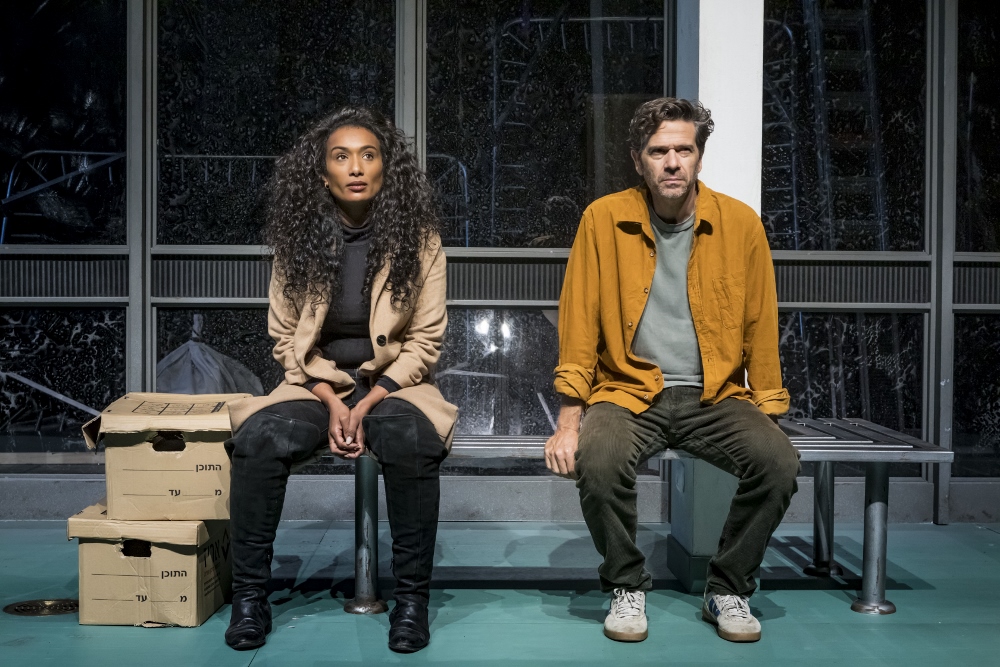
Layla Lavan, directed by Tamar Keenan, is an intense, important and challenging play that calls racism out into the open. The Cameri Theatre and the entire creative team is to be applauded for their choice in producing a play that focuses on racism, and for the way in which the play is presented. Layla Lavan is based on the Broadway play American Son by Christopher Demos-Brown, yet in this translation and adaptation, Gur Koren and Irad Rubinstain have made it entirely our own. The narrative remains essentially the same, taking place at a police station in the middle of the night, with a frantic mother trying to get an indifferent policeman to help her find her son. Yet while in the original version the mother is a Black American and the policeman is white, in this production the different roles and social context have been written to reflect Israeli society and culture. The strength of Koren and Rubinstain’s adaptation is in revealing the nuances of racism, the subtle racism that hides beneath a veneer of openness and humanity. Layla Lavan is most striking when it touches precisely those nerves that we do not realize are exposed.
The play is set in the dismal waiting area of a police station, with a couple of benches, a vending machine, and boxes and boxes of files that do not give the impression of efficiency or competence. It’s after 3am and the rain keeps pouring down the windows as Elisheva (Ruth Asarsai) leaves yet another message for her son Addis. Asarsai delivers a sensitive and moving performance as Elisheva, communicating not only the anguish of any mother whose child is missing, but also the awareness and experience of a mother raising a black son in a world that views him with hostility and suspicion. Raviv, the policeman on shift, whose main effort seems to be shifting responsibility as he keeps saying that he’s new to this station, having been transferred due to a heel spur. Yoav Levi exudes a comic, bumbling incompetence which not only relieves some of the tension is this very stark, tight, and intense drama, but also sneakily elicits the audience’s empathy for this flawed, fellow human. That empathy is key to the discomfort we are likely to feel when Raviv insists that he is not racist, and offers examples to prove it. After all, he served with an Ethiopian in the IDF, great guy, and he can mention some Ethiopian celebrities. And we, the audience, sitting comfortably in our seats, want to distance ourselves from Raviv, because we’re not like that. Are we?
It’s difficult to write about the play without spoilers, as some of its impact is due to the basic information of the play. To a certain extent, this is a weakness of the original structure, in its reliance on the drama of an extreme situation and a construct that is very – there’s no other way to put it – black and white. In that sense, I feel that this play is a first step in the right direction, a bold and necessary move, placing racism center stage. While I felt that the characters as written were too closely allied to a particular representation, the performances of the entire cast were excellent and created a strong emotional experience.
Theatre can have many functions – entertainment, escape, and education are among those that come instantly to mind. Theatre reflects the social context of its time; it can be an affirmation of the existing social structure and mores, and it can also be a rallying cry for change. Layla Lavan – the name itself raises different associations. The literal meaning in Hebrew is “white night” – a term that refers to nights without sleep, yet the word “white” carries a heavier weight here. If Elisheva’s son Addis were white, none of this would be happening. The play exposes racist attitudes that may often be camouflaged as normative, for example, the lack of respect for Ethiopian culture that exists in the assumption that all Ethiopians should assimilate into (white/European) Israeli culture. The assumption of the desirability of assimilation. More poignantly, it raises burning questions with which parents must struggle. How do you raise a black daughter or son in a predominantly white culture? Do you encourage them to assimilate, to blend in as much as possible? Do you raise them to know and respect their heritage? Do you encourage them to seek out their individual identity and role models? Do you raise them to be confident, to feel that they can do anything? Do you raise them to be careful, not to stand out, not to make waves? There are no easy answers, but these are important conversations, and we all need to check ourselves. In Layla Lavan, Koren and Rubinstain have created a thought-provoking play that feels entirely Israeli, and its exposure of the nuances of Israeli racism and discrimination against Ethiopian Israelis resonates powerfully.
Layla Lavan
Based on American Son by Christopher Demos-Brown
Director: Tamar Keenan; Translated and adapted by Gur Koren and Irad Rubinstain; Set Design: Eran Atzmon; Music: Dafna Keenan; Costumes: Ronnie Shimrom; Lighting Design: Nadav Barnea; Assistant Director: Omer Boulanger Cohen; Cast: Ruth Asarsai, Ishai Golan, Yoav Levi, Adam Kanda





